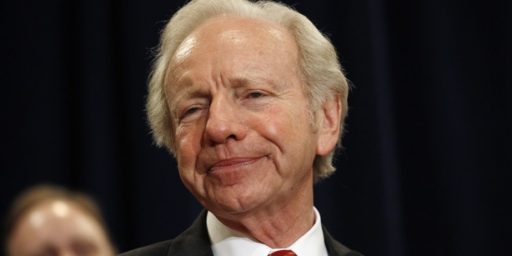Senate Confirms Alberto Gonzales as Attorney General
Senate Confirms Gonzales as Attorney General — First Hispanic Attorney General is Approved 60-36 (WaPo)
The Senate voted 60 to 36 to confirm Alberto Gonzales as attorney general Thursday, but only a handful of Democrats backed him after days of often strident debate over the administration’s torture policies for terrorism suspects. Gonzales, like Secretary of State Condoleezza Rice, now assumes one of the government’s most prominent posts with President Bush’s strong endorsement, but also trailed by accusations related to the administration’s war and terrorism policies. With only six Democrats voting aye — the smallest level of minority-party support in decades — the Senate action suggested that tensions between the two parties rival those of the Vietnam war and Watergate eras.
We needed this vote to establish that? Still, 60 votes is a fillibuster-proof supermajority.
Not since 1925, when the Senate twice rejected attorney general nominee Charles B. Warren, has a nominee received as few minority-party votes as Gonzales did, according to Senate historians. Four years ago an evenly divided Senate voted 58-42 to confirm John D. Ashcroft, with eight Democrats joining all 50 Republicans in backing the outspoken and often controversial former senator. Most attorneys general have been confirmed easily, sometimes unanimously. Aside from Ashcroft, the closest votes in recent decades involved Edwin Meese III (R), confirmed 63-31 in 1985, and Griffin B. Bell (D), confirmed 75-21 in 1977.
The nature of partisan bickering has simply changed so much as to make comparisons with the distant past meaningless for such things. There used to be such things as a “honeymoon” for a newly elected or reelected president.
The strategic mindset of the Democrats here is just mindboggling. They’ve just been handed a third straight defeat in the national electorate. It’s not without coincidence that Gonzalez’ margin exceeded Ashcroft’s despite fewer Democrats voting for him.
All 55 Republican senators voted for Gonzales except Conrad Burns (Mont.), who was absent. The six Democrats who voted for him were Mary Landrieu (La.), Joseph I. Lieberman (Conn.), Ben Nelson (Neb.), Bill Nelson (Fla.), Mark Pryor (Ark.) and Kenneth Salazar (Colo.). All but Lieberman are from states that Bush carried in November.
Hardly coincidental, methinks. And Lieberman is up for re-election in two years in a partisan swing state.
Three Democrats — Max Baucus (Mont.), Kent Conrad (N.D.) and Daniel Inouye (Hawaii) — did not vote. The remaining 35 voted no, as did Sen. Jim Jeffords (I-Vt.).
One suspects all three would have voted for Gonzales had they gone on the record. Bush carried the first two in both 2000 and 2004 and came close to picking off Hawaii this go-round.






Mary Landrieu (La.), (voted for)
Mary is running scared for her life. She won by like 100 (fraudulent) votes back before close elections were really contested and she won re-election by not a bunch more.
We now have the first R Senator since reconstruction and Bush won La. by like (I forget) 30 points or something… Na, this ain’t the hill she’s going to take a stand on.
She is still a lefty lefty liberal… but one who understands how to get elected.
In what bizarro world is Connecticut a “partisan swing state?”
Also “third straight defeat in the national electorate?” — In 2000, Democrats picked up 2 House seats, 4 Senate seats and a Governorship. And the Democratic candidate for President lost in an extremely close race, that easily could have gone the other way, if a Democratic administration had been overseeing vote counting.
SoloD: CT has had many Republican governors, senators, and representatives over the years:
http://www.issues2000.org/states/ct.htm
Governor:
* Jodi Rell Republican CT Governor
Senate:
* CT Senate Debate
* Chris Dodd Democratic Sr Senator (CT)
* Joseph Lieberman Democratic Jr Senator (CT), ran for V.P. with Gore, ran for president 2004
House:
* Rosa DeLauro Democratic Representative (CT-3)
* Nancy Lee Johnson Republican Representative (CT-5)
* John Larson Democratic Representative (CT-1)
* Jim Maloney Democratic Representative (CT-5)
* Christopher Shays Republican Representative (CT-4)
* Rob Simmons Republican Representative (CT-2)
Former officeholders:
* John Rowland Former Republican CT Governor
* Barbara Bailey Kennelly Former Democratic Representative (CT-1)
* Gary Franks Former Republican Representative (CT-5)
Lowell Weicker was a Republican (in name only, granted) as a U.S. Senator and was governor as an Independent.
James,
You are correct in saying that CT has had its share of Republicans, but by that standard, Georgia, Massachusetts and Oklahoma are also swing states.
My point would be that on a national level, CT is as firmly as Democratic leaning as you can get. (A point my wife, who is greatly distressed to be trapped in this sea of blue, agrees.)
Solo: I see what you mean. I just meant that CT is a state where Republicans can compete for a Senate seat. Not that Lieberman is in any great danger. Despite a not-that-great ACU rating, he’s very well liked among Republicans and I don’t think there will be enough of a challenge from the left to hurt him in the primaries.